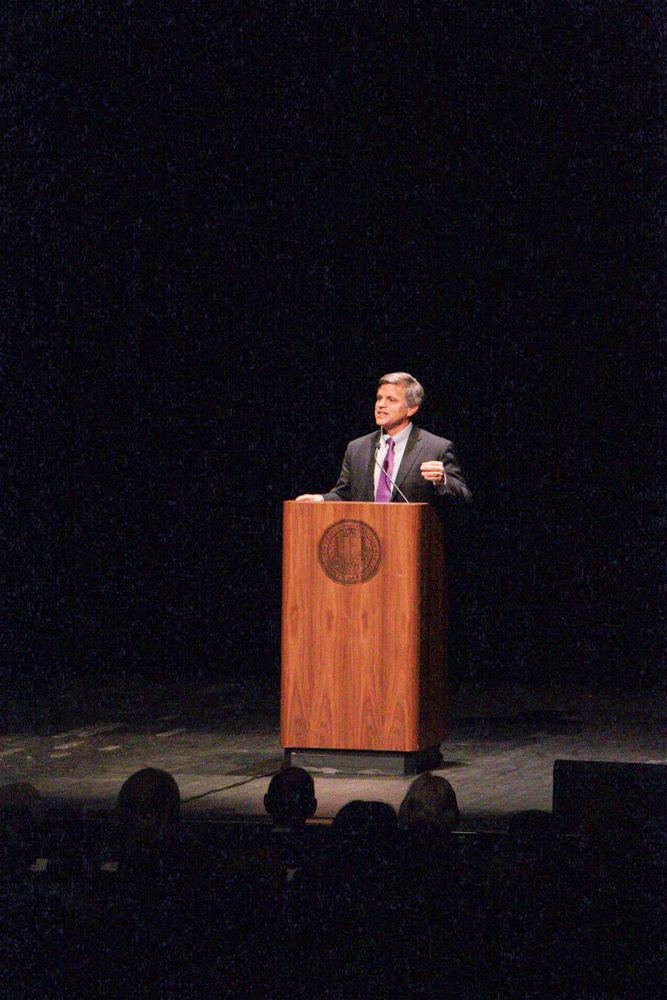
Andrew Melese
Staff Writer
Presidential historian Douglas Brinkley addressed a lively audience at Campbell Hall Thursday night. Brinkley dazzled his audience with the remarkable story of how Theodore Roosevelt, Franklin Delano Roosevelt, and other Presidents protected or renewed most of the wild lands that Americans know today.
He spoke at a moderate clip but threw so much information toward the audience that “oohs” and “awws” were almost ceaseless. While Brinkley’s lecture largely involved how Theodore Roosevelt became one of the world’s most successful conservationists, he added side-notes about key staffers and even the odd anecdote or personal connection.
“Theodore Roosevelt had a bad case of asthma … I did too; so I identified with that,” he quipped.
He also noted that Theodore Roosevelt grew up as a son of an anti-slavery, pro-union Republican father. “Remember, this was the republican party of Lincoln [Theodore belonged to],” Brinkley said. One of the essential points Brinkley made regarding TR was that he used every creative angle to satisfy an obsession with preserving wild creatures and landscapes alike: “The Antiquities Act came about as a means to preserve pottery and dinosaur bones.” The first parks were helping archaeologists who didn’t want their research sites destroyed.
“People were using the act to preserve areas the size of a crime scene,” Brinkley said. “It had a provision within it that the president could declare a monument based on him deeming an area of scientific significance. Theodore Roosevelt protected the whole Grand Canyon and declared that it was the most scientifically notable instance of erosion.” This first national monument precipitated what would lead to more land being set aside for conservation than any other law or policy.
Later, Brinkley discussed the role of FDR for our parks. He spoke as highly of him—as an environmentalist—as the former Roosevelt, because FDR created as many national parks and monuments as he could. Additionally, through the Civilian Conservation Corps, FDR had “over three billion trees planted in the United States.”
Brinkley’s eyes lit up with perhaps an even more extraordinary piece of information regarding FDR. “Franklin Roosevelt created a slogan that ‘conservation is the purveyor of permanent peace,’” he said. FDR intended to make this mantra a central theme at the first United Nations conference and, additionally, to submit international standards for particulate and chemical pollution to preserve the world’s environment. Tragically, Brinkley said, he died and successor Harry Truman had no intention to continue in that direction.
Brinkley held the utmost regard for Theodore and Franklin Roosevelt as environmentalists. This was not the case for others. Brinkley described Warren Harding, Calvin Coolidge, Herbert Hoover, Truman, Dwight Eisenhower and Ronald Reagan as lacking an earnest ethic for the stewardship of land or game.
This got me wondering about another president: John Fitzgerald Kennedy. Brinkley didn’t mention JFK, so during the Q & A session I shared my curiosity: “You stated that Truman didn’t have an earnest conversation ethnic but that TR and FDR did. Where do you find President Kennedy in this regard?”
Excited to answer, Brinkley replied, “He signed every conservation bill that came before him in the Senate,” he responded, adding, “After he supported the research of Rachel Carson, [the Kennedy White House became an intellectual hub for conservation.”
Douglas Brinkley fascinated and captivated his audience, clearly demonstrating his expertise. It was a pleasure to hear him speak.










